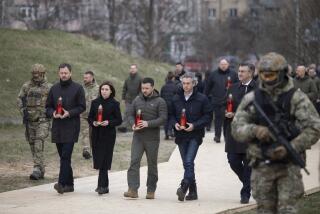After Inspectors Return, U.N. Issues Warning to Iraq
- Share via
UNITED NATIONS — The U.N. commission charged with stripping Iraq of its illegal weapons issued a new admonition to Baghdad on Saturday, rebuffing more conciliatory language favored by Russia.
The warning came in a 7 1/2-page report to the U.N. Security Council made public only hours after the commission’s weapons inspectors completed their first investigations in Iraq since being readmitted to the country Friday.
The inspectors, including four Americans, encountered no difficulties from the Iraqis, U.N. officials in Baghdad told the Associated Press, but the commission’s report nonetheless stressed Iraq’s responsibility to provide “immediate, unconditional and unrestricted” access to sites under investigation and cited Iraq’s record of “systematic concealment.”
It also urged Iraq to respond to unanswered questions about its nuclear, biological and chemical weapons programs and its capacity to build long-range missiles; called for greater air surveillance of the country, including night flights; and proposed basing more of its surveillance aircraft in Iraq.
Richard Butler, the commission’s chairman, emphasized the same message in a talk with reporters after delivering the report to the Security Council.
“We need Iraq to allow us to go anywhere, anyplace to do our work,” Butler said.
Delegates from the United States and Britain, the two countries that have taken the hardest line with Iraq in the dispute over weapons inspections, hailed the report. Bill Richardson, the American ambassador to the U.N., claimed an outright U.S. victory over Iraqi President Saddam Hussein.
“Saddam has blinked,” Richardson said. “Iraq has not gotten anything out of this.”
Iraqi Ambassador Nizar Hamdoun was visibly glum after reading the report. “I don’t like it,” he said. “It didn’t meet Iraq’s major basic concerns.”
The report was completed at midnight Friday after a long meeting of the multinational commission, which acts as an advisory board to Butler’s disarmament team. The commission normally meets twice a year, but Russia requested an emergency session as a result of the crisis, which had deepened when Iraq deported the American inspectors and Butler pulled out the rest in protest.
The Russian member of the commission, Gennady Gatilov, used the meeting to propose several changes favored by Iraq, apparently as part of the arrangement Moscow cut with Baghdad that resulted in the return of the inspectors.
Most, however, were rejected by the rest of the commission.
Two of the Russian suggestions were intended to nudge the U.N. toward lifting sanctions on Iraq. One proposal was that the commission agree that Iraq no longer has a nuclear weapons program, and the other was to set a January 1998 deadline for certifying that it has no long-range missile capacity.
U.N. resolutions ending the 1991 Persian Gulf War require the commission to certify that Iraq no longer has nuclear, biological and chemical weapons or long-range missiles before the economic embargo against it can be lifted.
Instead, the report issued Saturday repeated earlier findings that while Iraq is close to meeting U.N. requirements on nuclear weapons and long-range missiles, there is still important information missing.
Also rejected was a proposal to appoint two deputies to Butler in addition to Charles Duelfer, who is the highest-ranking American on the commission staff. Gatilov also recommended hiring more inspectors to achieve “more balance” among nationalities.
*
The Russian rebuff was further evidence of the disagreement between Washington and Moscow on the best tactics to use with Hussein. Russia increasingly has pushed for an accelerated end to sanctions and has promoted a policy of rewarding the Iraqi government when it cooperates with the U.N. The U.S. is quicker to penalize Hussein when he fails to cooperate.
A White House official said Saturday that President Clinton and Russian President Boris N. Yeltsin remain at odds over the issue.
“There’s disagreement between us on the terms on which the sanctions ought to be ended,” the official said on the condition that he not be named.
The two leaders spoke by telephone for 40 minutes Saturday, White House spokesman Mike McCurry said.
Clinton and Yeltsin disagreed on the timing for softening the sanctions against Iraq, and Clinton said he urged Yeltsin to stay united with other leaders on the question.
“What I emphasized to President Yeltsin is, we have come a long way by working together and we have to continue to work together,” Clinton said. “And the decisions about what to do with the inspections should be made based on the evidence, the facts and the professional judgment of the inspectors. Neither the political inclinations of the United States nor of the allies should control those decisions.”
Times staff writer Elizabeth Shogren in Denver contributed to this report.
More to Read
Sign up for Essential California
The most important California stories and recommendations in your inbox every morning.
You may occasionally receive promotional content from the Los Angeles Times.










